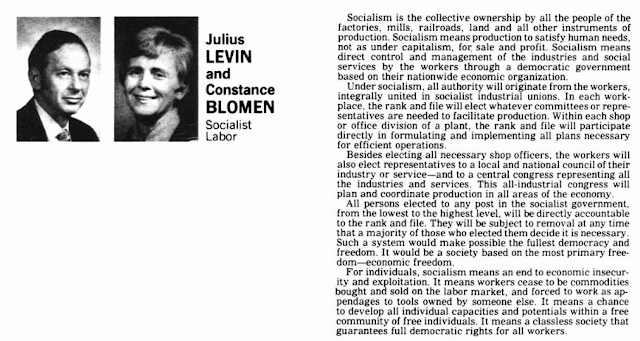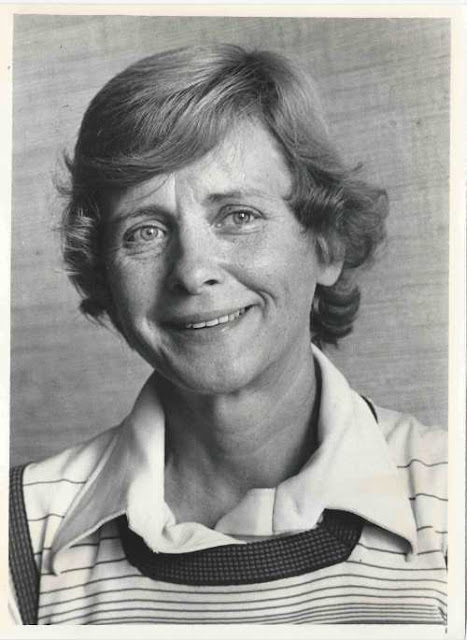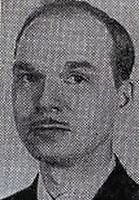Stephen Emery, August 20, 1908 (Passaic, NJ) - September 4, 1995 (Manassas, Va.)
VP candidate for Socialist Labor Party (aka Industrial Government Party) (1948, 1952)
Running mate with nominee (1948): Edward A. Teichert (1904–1974)
Running mate with nominee (1952): Eric Hass (1905–1980)
Popular vote (1948): 29,244 (0.06%)
Popular vote (1952): 30,406 (0.05%)
Electoral vote (1948, 1952): 0/531
The campaign (1948):
The SLP nominated Edward A. Teichert for a second time, but in this round his running mate was Party stalwart Stephen Emery of New York.
The 1948 platform anticipated the Military-Industrial Complex and never-ending war-based economy that President Eisenhower warned the country against over a decade later. The Party also criticizes the "Gestapo-like" tactics of the government efforts to root out "disloyalty."
Just like the Socialist Workers Party 1948 platform, the SLP took a swipe at some of the other Leftist parties, especially as they saw themselves as the only pure Marxists, and all others, including the Soviet government, as poseurs--
The Socialist Labor Party appeals to you to accept the logic of these facts: WAR, FASCISM, AND POVERTY AMIDST PLENTY ARE THE EVIL BROOD OF CAPITALISM. No worker who reaches this conclusion can, without consciously aligning himself with the forces of reaction, support the parties that have as their aim the preservation of capitalism. In this category, besides the Republicans and Democrats, we include the "Third Party Progressives" (who acclaim "progressive capitalism"), and the "Liberal," "Labor," "Socialist" and "Communist" reformers. To speak of "progressive capitalism" today is as nonsensical as it would have been to speak of "progressive slavery" in 1860. And to propose capitalist reforms is to help prolong the capitalist cause of war and fascism. The logic of this is inescapable.
The Socialist Labor Party, therefore, calls upon the American workers, and all other enlightened citizens, to repudiate the parties of capitalism, and to support its program for a Socialist reconstruction of society.In an election year filled with third parties, the SLP placed 7th. With votes recorded in over 20 states they fared the best in Massachusetts (0.26%) and Minnesota (0.21%).
The campaign (1952):
In 1952 the SLP maintained Emery as the running mate but for President they nominated Eric Hass, who would go on to run in three more elections as the Party standard bearer.
The 1952 SLP platform blasts the Korean War, the Soviets, and the Red Scare in America. Some selections--
The Korean war, a senseless war to all but the capitalist and Russian imperialist interests that profit from it, is a tragic consequence of ruling-class confusion and the military approach in international relations.---
By means of falsehoods and smears, whipped-up hysteria, witch-hunts and loyalty oaths, the capitalist plutocrats are attacking the very heart of American political democracy. They are imposing a "black silence of fear" on millions of once proudly independent and fearlessly outspoken Americans.The Socialist Labor Party declares that the real target of this un-American attack is not the Communists, but the fundamental rights and civil liberties of the American people. The Communists are merely a convenient and vulnerable target. It has been said, not without logic, that if there were no Communist party in America, the capitalist reaction would organize one.Eric Hass' effort to rebuilt the SLP were starting to pay off. Although their national result in 1952 was minuscule, they placed higher than usual (5th) and for the first time outpolled their dying rival, the Socialist Party of America. Best showings: New Jersey (0.24%) and Illinois (0.21%).
Election history:
1950 - US Senate (NY) (Socialist Labor Party) -
defeated1953 - New York City Council President (Industrial Government Party) -
defeated1954 - Lt. Governor of New York (Industrial Government Party) -
defeated1957 - New York City Council President (Socialist Labor Party) -
defeated1958 - US Senate (NY) (Socialist Labor Party) -
defeated1961 - New York City Council President (Socialist Labor Party) -
defeated1962 - US Senate (NY) (Socialist Labor Party) -
defeated1965 - New York City Controller (Socialist Labor Party) -
defeated1970 - Governor of New York (Socialist Labor Party) -
defeated1978 - Governor of California (Socialist Labor Party) -
defeatedOther occupations: subway dispatcher
Buried: ?
Notes:
The winner in the 1970 Governor of NY race was Nelson Rockefeller.
The winner in the 1978 Governor of Calif. race was Jerry Brown.
Parents were Hungarians who immigrated in 1904.
Ruled off the ballot in the 1958 US Senate race so ran as a write-in.
Still on record being active with SLP in 1989, when he donated $20,000 to the Party.
Was attacked, beaten and robbed by an Army deserter while fishing near Placerville, Calif. in late
May 1984. Among other things his jaw was broken and his Honda station wagon stolen. Francis
James Snyder was captured and entered a guilty plea in court.

















































